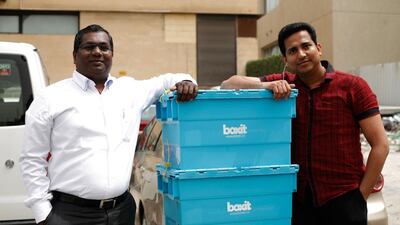KUWAIT CITY // Premlal PK left his home in India’s Kerala state in April 2012 and moved to the Kuwaiti capital to begin a new life.
Three years later he is among a number of new entrepreneurs launching companies in the country.
Harnessing new technology and the drive that comes from doing what one loves, these businesspeople are trying to succeed at a time when Kuwait aims to diversify its economy away from oil. The government is expected to launch a US$7 billion (Dh25.7bn) fund for small and medium-sized businesses later this year.
Abdulaziz Al Loughani, vice chairman and executive director of the Kuwait National Fund for SMEs Development, confirmed to The National that the fund will become active this year. The fund is thought to be one reason why investors are now choosing to back new companies.
Several business start-up incubators have also launched in Kuwait to guide young entrepreneurs.
Establishing a business is no small endeavour in Kuwait, a country notorious for red tape. For foreigners, one of the key challenges is a law that requires a local partner. For Kuwaitis, there is endless bureaucracy, high fees, and a business atmosphere not conducive to competition.
“One of the biggest challenges faced when establishing Jaribha in Kuwait was the overwhelming difficult requirements that government had placed on us,” said Saleh Al Tunaib, co-founder of Jaribha, a crowdfunding platform based in Kuwait.
“What was evident from these hideous requirements to license an e-business was that they lacked the ability to understand and acknowledge the importance of the technology and it presence in this region.”
Dubai is considered to be an easier place to establish a company in the Gulf, according to several young entrepreneurs in Kuwait.
Samar M Baqer, a professor of entrepreneurship and marketing at Kuwait University, said the number of new companies that have established themselves in Kuwait in the last three years could foster change in the economy and create new jobs.
“Now, in Kuwait, 2015 is the year of educating the young generation that when you create a new business it’s not about making a cupcake at home, and it’s not about designing a new deraa, or new abaya. It’s about creating a second market, a second economy for Kuwait because we really need to go in that direction, especially with the current situation with the oil prices,” she said.
“I think there is a huge shift in 2015 and we will see the fruit of that in the next couple of years.”
A key reason that start-ups are having such success is that private investors are expecting the money from the National Fund for SMEs Development.
“Everybody is waiting for that fund to officially work,” said Ms Baqer.
The idea for Mr Premlal’s company, Boxit, is simple, but already attracting attention in Kuwait’s business start-up community. Boxit stores clients’ possessions in warehouses and offers them a mobile phone application to keep track of the items in a “visual catalogue”.
After packing their possessions, clients snap a photo before the recyclable boxes provided by the company are sealed. This way, the clients can track which items are in which box. With a few taps in the app, they can request Boxit to return a specific box if the items inside are needed.
Before moving to Kuwait, Mr Premlal, 36, worked in the telecoms industry in Chennai. He wanted to work abroad in either Kuwait or the United States (he had friends in both these countries), but ended up choosing the former to be closer to his family back in India.
In Kuwait, he initially worked in logistics, but dreamed of having his own company. In July, he quit his job to focus on Boxit full time.
He came up with the idea for the company last March when he was organising his own home. “What if we could just store all these things in our neighbour’s house,” he told his wife.
But instead of space in a friend’s house, Mr Premlal, along with two other co-founders, decided to establish a company that stored people’s possessions in a warehouse and used the latest technology to allow them to remain close at hand.
By last August, Mr Premlal and his partners were convinced they had enough interest and market knowledge to move forward.
They realised that they could not do everything themselves, however. They approached Sirdab Lab, a Kuwait City-based business start-up accelerator for help with fine-tuning their approach.
“We had the passion and the drive and the hunger to do things. They channelled those things in the right direction,” said Mr Premlal.
At Sirdab Lab they connected with Abduallah Al Sayer, a Kuwaiti entrepreneur, who joined Boxit to help with the company’s strategy.
“It was just a matter of fine-tuning what he had,” Mr Al Sayer said of Mr Premlal.
Soon after they received $74,000 from angel investor Sabah Al Bader. The company is now seeking about $1 million in a second round of funding.
Interest in Boxit is growing and the company has rented office space in Kuwait’s City’s luxurious Hamra Tower, a well-known landmark that Mr Premlal hopes will signal to clients and investors how committed he is to doing business in Kuwait.
“I want to show that I am serious about our business, not just someone that will come up and go,” he said.
On Wednesday, Mr Premlal and Boxit compete in the GCC Pitch Challenge finals in Abu Dhabi, part of an effort to support technology start-ups in Gulf Cooperation Council countries. He is also in talks with investors in Dubai to expand the company into the UAE.
jvela@thenational.ae

